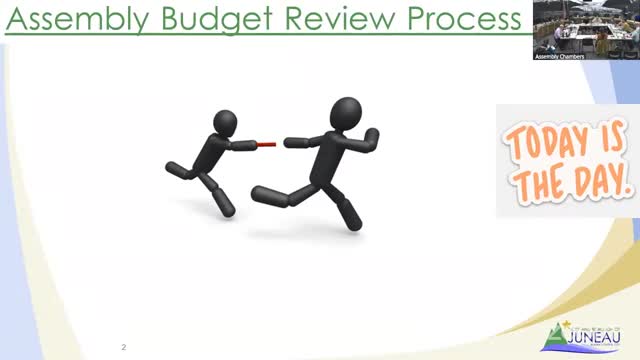City manager outlines FY26 budget schedule, flags federal grant and revenue risks
Get AI-powered insights, summaries, and transcripts
Subscribe
Summary
Juneau’s manager and budget staff presented a status‑quo FY26 proposal and a multiweek review schedule, telling the Assembly Finance Committee that federal grant uncertainty and softer sales tax and passenger‑industry signals are the largest risks to the plan.
The Juneau City and Borough manager’s office presented the Assembly Finance Committee with the manager’s proposed FY26 budget on April 5, emphasizing a status‑quo approach and a calendar of committee meetings through May that will lead to a final budget for the full Assembly on June 9. Budget staff framed the next six weeks as a “baton handoff” from managers and empowered boards to the Assembly, noting that no major decisions were required at the initial review meeting but that several topic‑specific sessions are scheduled, including April 30 for utility rates and May 7 for school bonds and passenger fee and capital discussions.
The manager’s proposed budget keeps ongoing services at current levels and assumes a modest 2% placeholder for bargaining‑unit wage increases while noting that actual contract outcomes could be higher. Staff said FY26 revenues are projected at roughly $455 million on the citywide picture that includes the hospital and empowered boards, and that most of the year‑over‑year revenue increase comes from charges for services tied to Bartlett Regional Hospital. On the expense side, the proposed consolidated budget (including one‑time items) totals about $480 million, with $61 million in capital projects.
Why it matters: staff asked the Assembly to use the committee schedule to identify areas that need more time or data before decisions, and to remember that some items—Community Grants, school bonds, utility rates and the Eagle Crest subsidy—will be taken up on the pending list for later action. The manager also recommended preserving fund balance to help smooth risks should federal reimbursements or grant agreements be delayed or reduced.
Key risks flagged by the manager’s team include federal funding uncertainty, particularly for grants that have not yet reached signed agreements and for FEMA reimbursements related to recent disaster response; possible national economic softness that would reduce visitor spending and sales tax; and rising insurance and contract costs. Staff gave an example: about $11.7 million in federal support included in the proposal, if lost entirely, would require roughly 1.79 mills in property tax to replace—an illustration of the scale of exposure, not a prediction.
Staff left the committee with dates for follow‑up: April 16 and April 30 are already reserved for deeper reviews on community grants and utility rates, and multiple Wednesdays in May are set for further deliberations. The manager said the goal remains to place a final budget before the regular Assembly on June 9 to meet charter deadlines.
Ending: Finance staff told the committee they will publish an updated pending‑item list with each AFC meeting and encouraged members to submit requests for additional time on any topic. The timeline aims to balance a deliberate review with the charter requirement to approve the budget by early June.
